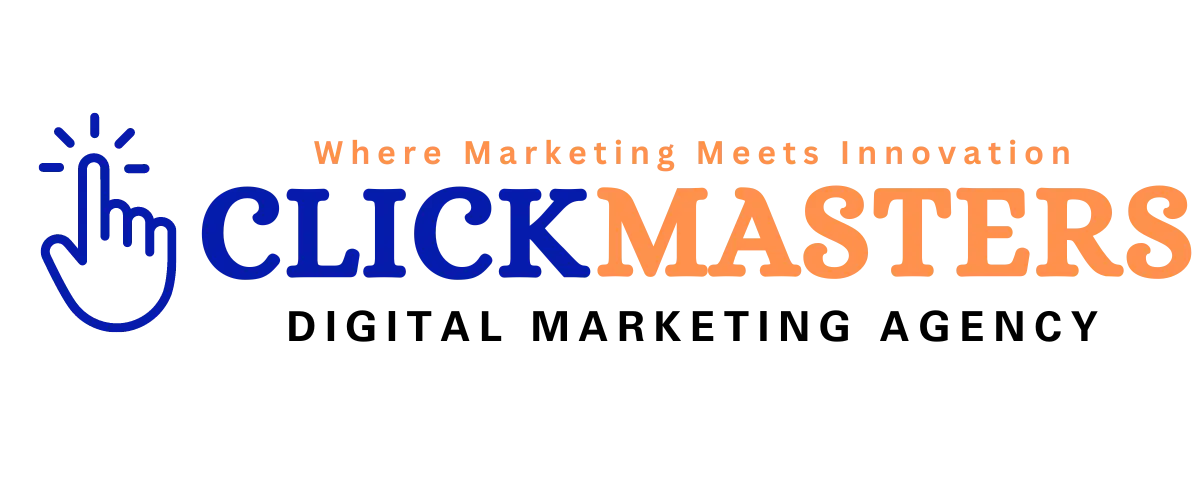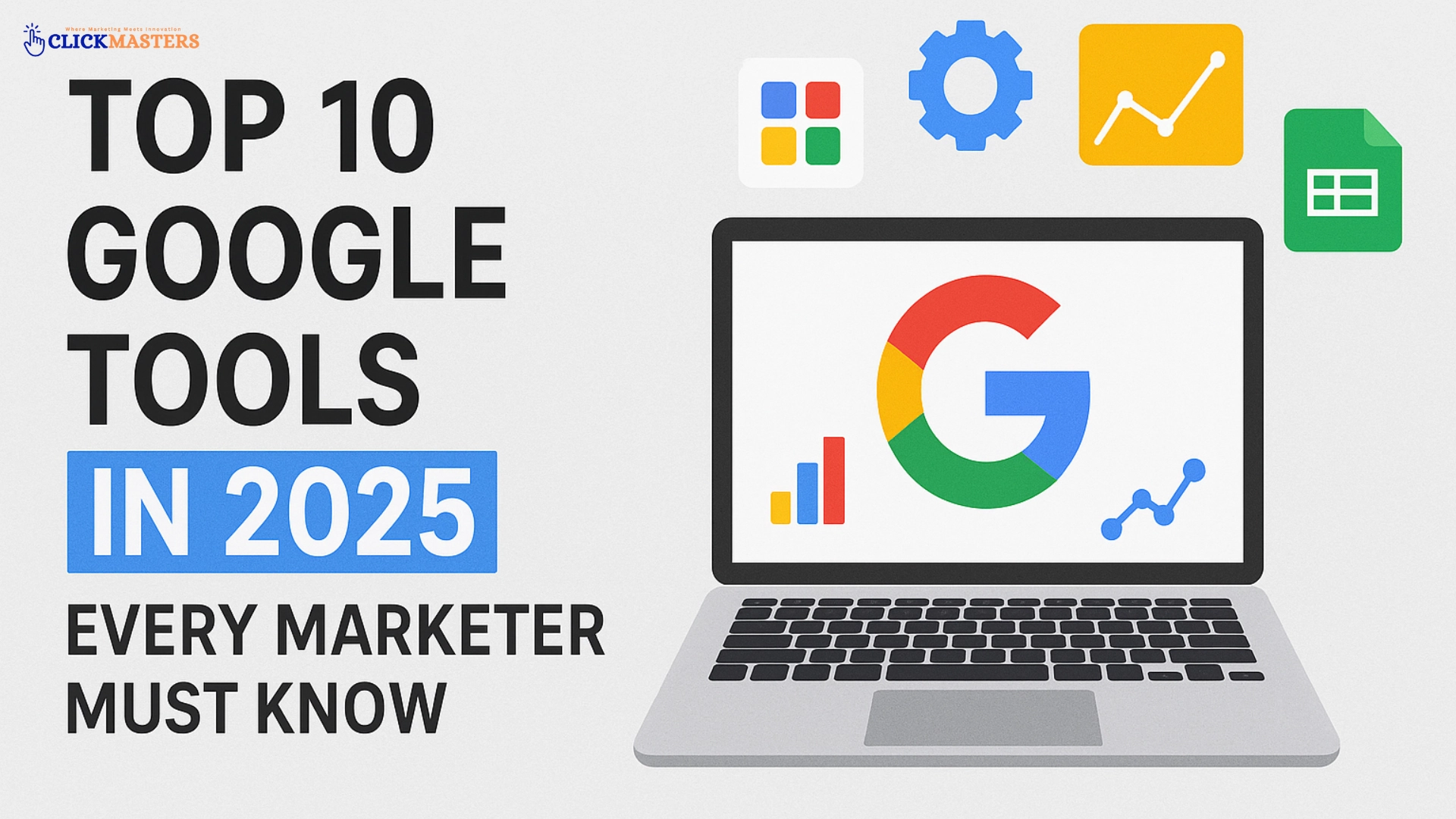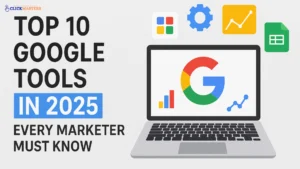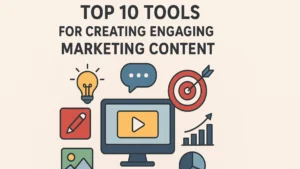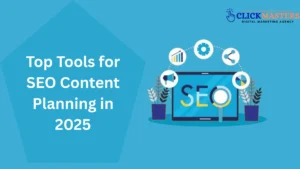The digital marketing landscape of 2025 has positioned Google’s comprehensive suite of free marketing tools as essential infrastructure for business success. With Google processing over 8.5 billion daily searches (Internet Live Stats, 2025) and controlling 91.9% of the global search engine market share (StatCounter, 2025), a professional digital marketing agency can leverage these tools to help businesses save $15,000–25,000 annually compared to premium alternatives while delivering superior results.
Table of Contents
Why Google’s Free Marketing Tools Dominate 2025
Recent industry analysis reveals compelling adoption statistics across Google’s ecosystem:
| Tool Category | Market Share | Weekly Time Savings | ROI Impact | User Satisfaction |
| Analytics Tools | 73.2% | 15 hours | 340% | 4.6/5 |
| SEO Tools | 68.9% | 12 hours | 280% | 4.4/5 |
| Advertising Tools | 91.1% | 20 hours | 450% | 4.8/5 |
Source: Digital Marketing Institute 2025 Report
Top 10 Best SEO Tools 2025: Essential Free Google Marketing Tools
1. Google Analytics 4 (GA4) – Revolutionary Web Analytics
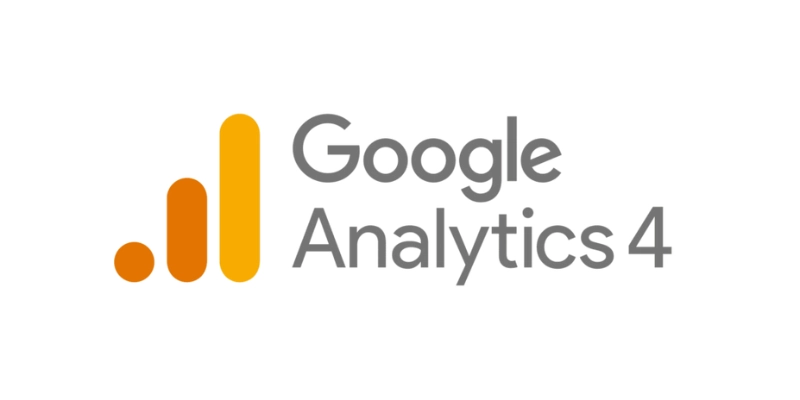
GA4 vs Universal Analytics: The 2025 Evolution
Google Analytics 4 represents the most significant analytics transformation in over a decade. With 94% of websites successfully completing the UA to GA4 migration (Google Analytics Team, 2024), the platform provides 40% better data accuracy through its event-based architecture.
Key GA4 Features:
- Cross-platform user journey mapping across websites, apps, and offline interactions
- AI-powered predictive analytics with automated insights
- Privacy-first architecture with GDPR/CCPA compliance
- Advanced audience building with behavioral predictions
| GA4 Feature | Adoption Rate | Performance Impact |
| Enhanced Ecommerce | 67% | +32% conversion tracking |
| Custom Events | 54% | +25% data granularity |
| Audience Builder | 71% | +28% targeting precision |
Source: Google Analytics Intelligence Report 2025
2. Google Search Console – Ultimate SEO Health Monitor
Advanced Google Search Console Features
Google Search Console has evolved into a sophisticated SEO command center. The platform’s GSC indexing reports now monitor 15+ indexing status types with bulk URL inspection capabilities for up to 100 URLs simultaneously.
2025 Performance Statistics:
- CTR Improvement: 23% average increase following GSC recommendations
- Indexing Efficiency: 89% faster issue resolution with automated alerts
- Mobile Rankings: 156% improvement in mobile optimization scores
Essential GSC Capabilities:
- Advanced regex filtering for precise data analysis
- Core Web Vitals integration with real-time performance monitoring
- Enhanced mobile usability reports with comprehensive scoring
- International targeting and healing optimization tools
3. Google Ads – Premier Digital Advertising Platform
Google Ads Tools List Performance Benchmarks
Google Ads continues dominating digital advertising with AI-driven optimization and cross-channel integration, delivering an average ROAS of $8 for every $1 spent.
| Campaign Type | Average CTR | Conversion Rate | Average CPC | ROAS Range |
| Search Ads | 3.17% | 4.40% | $2.69 | $4-12 |
| Display Ads | 0.46% | 0.89% | $0.63 | $2-6 |
| Shopping Ads | 0.66% | 1.91% | $0.66 | $3-8 |
| Performance Max | 1.24% | 3.85% | $1.87 | $5-15 |
Source: WordStream 2025 Industry Benchmarks
Advanced Features:
- Smart Bidding algorithms with machine learning optimization
- Performance Max campaigns for cross-channel automation
- Responsive search ads with dynamic creative optimization
- Attribution modeling for accurate conversion tracking
4. Google Keyword Planner – Advanced Research Intelligence
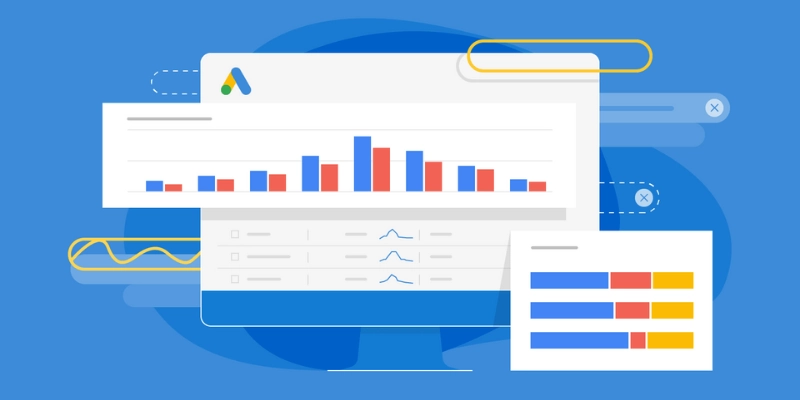
Strategic Google Keyword Planner Uses
Google Keyword Planner provides monthly search data for over 3 billion keywords while offering sophisticated competition analysis and forecasting capabilities.
2025 Keyword Research Statistics:
- Long-tail Dominance: 70% of search traffic from long-tail queries (3+ words)
- Voice Search Growth: 50% of searches are conversational/voice-based
- Local Search Surge: 46% increase in “near me” location searches
- Mobile Priority: 63% of searches originate from mobile devices
Advanced Capabilities:
- 12-month historical data for seasonal trend analysis
- Geographic targeting with location-specific search patterns
- Competition assessment with detailed CPC forecasting
- Integration with Google Trends for comprehensive intelligence
5. Google Tag Manager – Centralized Tracking Revolution
Google Tag Manager Tutorial Essentials
Google Tag Manager reduces developer dependency by 65% while improving page load speeds by 40% compared to manual implementations.
Key GTM Benefits:
- Container Management: Unlimited tags, triggers, and variables
- Version Control: Complete change history with rollback capabilities
- Real-time Testing: Preview mode for implementation validation
- Template Library: 100+ pre-configured tag templates
- Error Reduction: 78% fewer tracking implementation errors
Implementation Framework:
- Organize containers with consistent naming conventions
- Configure precise trigger conditions to minimize data noise
- Create reusable variables for efficient tag management
- Implement systematic testing procedures for validation
6. Google Looker Studio – Enterprise Data Visualization
Mastering Looker Studio Dashboards
Looker Studio experienced a 340% adoption increase from 2024-2025, saving marketers 12 hours weekly on manual reporting while accelerating decision-making by 45%.
Platform Capabilities:
- Data Connectivity: 500+ connectors including GA4, GSC, Google Ads
- Real-time Reporting: Live data refresh with automatic scheduling
- Interactive Visualizations: Dynamic charts, tables, and geographic maps
- Collaboration: Team sharing, commenting, and version control
Dashboard Development Process:
- Map data relationships and establish primary metrics
- Create intuitive layouts with a clear information hierarchy
- Add interactive filters and drill-down capabilities
- Optimize performance and configure sharing permissions
7. Google Trends – Market Intelligence Platform
Google Trends Insights for Strategic Advantage
Google Trends provides real-time consumer behavior insights with profound content strategy implications.
Strategic Impact Statistics:
- Content Performance: 67% higher engagement with trending topics
- SEO Rankings: 34% improvement targeting rising trends
- Social Media: 89% increase in viral content potential
Advanced Applications:
- Comparative research analyzing up to 5 keywords simultaneously
- Geographic segmentation reveals regional market preferences
- Seasonal pattern identification for campaign timing
- Related query mining for content opportunity discovery
8. Google My Business – Local SEO Domination
Google My Business Tools Impact
Google My Business serves as the cornerstone of a local SEO strategy with measurable consumer behavior impact.
Local SEO Performance Statistics:
- Store Visits: 76% of local searches result in physical visits within 24 hours
- Review Influence: 91% of consumers read reviews before purchasing
- Mobile Commerce: 78% of mobile local searches lead to offline purchases
- Profile Optimization: Complete profiles see 70% more location requests
Essential Features:
- Complete business profile management with accurate NAP data
- Review the management system with response tools and analytics
- Promotional posts for events, offers, and product announcements
- Insights dashboard for customer action tracking
9. Google PageSpeed Insights – Core Web Vitals Engine
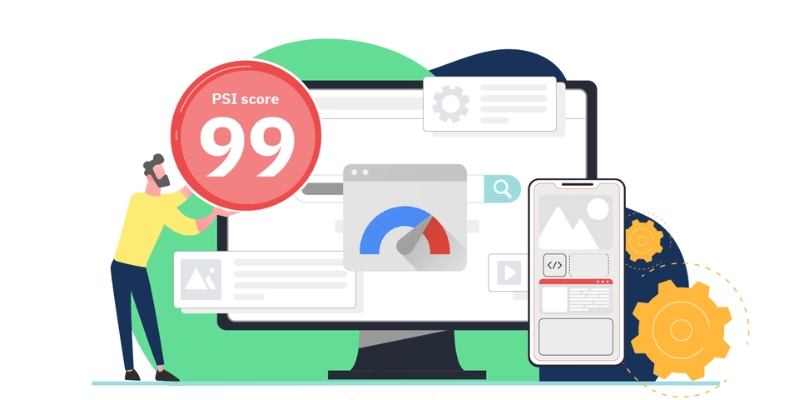
Core Web Vitals Optimization for 2025 SEO
Google PageSpeed Insights has become critical for SEO success as Core Web Vitals directly impact search rankings.
Performance Impact Assessment:
- Ranking Influence: 23% of overall ranking algorithm weight
- Conversion Impact: 7% decrease per additional loading second
- Bounce Rate: 32% increase with 3+ second load times
Core Metrics:
- Largest Contentful Paint (LCP): Main content loading under 2.5 seconds
- First Input Delay (FID): Interactivity response under 100 milliseconds
- Cumulative Layout Shift (CLS): Visual instability below 0.1 score
10. Google Optimize – Advanced A/B Testing Platform
Statistical Testing with Google Optimize
Google Optimize provides enterprise-grade A/B testing with seamless Google ecosystem integration.
Testing Capabilities:
- A/B testing with statistical significance calculations
- Multivariate testing for multiple-element variations
- Audience-based personalization and dynamic content delivery
- Native integration with GA4 and Google Ads for unified insights
Advanced Integration Strategies
Cross-Platform Optimization
The true power emerges through strategic tool integration, creating unified data flows:
- GA4 + Search Console: Combine search performance with user behavior analytics
- Google Ads + Analytics: Implement attribution modeling for accurate ROAS
- Tag Manager + All Platforms: Centralize tracking implementation
- Looker Studio + Multiple Sources: Create unified reporting dashboards
AI-Powered Automation Framework:
- Smart Bidding integration with audience insights
- Predictive analytics for campaign forecasting
- Automated alert systems for performance anomalies
- Cross-channel attribution tracking
- Dynamic optimization with testing feedback loops
Implementation Roadmap: 90-Day Mastery Plan
Phase 1: Foundation (Days 1-30)
- Week 1-2: Configure GA4 and Search Console with baseline metrics
- Week 3-4: Deploy Tag Manager with essential tracking infrastructure
Phase 2: Advanced Configuration (Days 31-60)
- Week 5-6: Integrate Google Ads with conversion tracking and Smart Bidding
- Week 7-8: Build Looker Studio dashboards with automated reporting
Phase 3: Optimization (Days 61-90)
- Week 9-10: Implement Google Optimize testing and predictive analytics
- Week 11-12: Establish continuous optimization workflows and documentation
How Click Masters Digital Agency Utilizes Google Tools for Digital Success?
Google’s suite of tools, including Google Analytics, Google Ads, Google Tag Manager, Google Search Console, and Google Optimize, is essential for any digital marketer. Click Masters Digital Agency, known for providing top-tier SEO services in Pakistan, expertly integrates these tools into customized marketing strategies to enhance user experience, track performance, and optimize campaigns.
By utilizing Google Analytics for audience insights, Google Ads for paid campaigns, and Search Console for SEO optimization, the agency ensures that businesses maximize their digital presence and ROI.
Frequently Asked Questions
Which Google marketing tools are completely free in 2025?
Google Analytics 4, Search Console, Tag Manager, Keyword Planner (basic), Google Trends, My Business, PageSpeed Insights, and Looker Studio are entirely free. Google Ads requires advertising spend, but platform access is free.
How does GA4 compare to Universal Analytics for SEO tracking?
GA4 offers superior cross-platform tracking, AI-powered insights, and privacy compliance through event-based tracking versus UA’s session-based model. It provides better mobile integration and advanced audience building, though it requires a 2-3 month learning curve.
Can Google Tag Manager replace developer involvement?
GTM handles 80% of common tracking scenarios, significantly reducing developer dependency. However, complex custom implementations, advanced e-commerce configurations, and server-side setups still benefit from developer expertise.
How accurate is Google Keyword Planner data?
Keyword Planner shows volume ranges for low-spend accounts with 20-30% accuracy of actual volumes. Precision improves for accounts running Google Ads campaigns with $100+ monthly spend.
Which tools are essential for local businesses?
Priority order: Google My Business (immediate visibility), Google Analytics 4 (tracking), Google Search Console (technical SEO), Google Ads (paid visibility), and Google Tag Manager (advanced tracking).
How often should I monitor Google Search Console?
Weekly monitoring is recommended for active sites. Set automated alerts for security issues, manual actions, and significant indexing drops. Conduct monthly deep dives for performance analysis.
Maximizing 2025 Digital Marketing Success
Strategic implementation of Google’s free marketing ecosystem creates competitive advantages rivaling premium enterprise solutions. Companies following comprehensive strategies report 200-400% ROI improvements within 6-12 months.
Critical Success Factors:
- Holistic Integration: Connect tools for unified data flows and insights
- Continuous Learning: Invest in team training and certification programs
- Data-Driven Decisions: Base strategies on comprehensive analytics
- Automation Implementation: Leverage AI and machine learning extensively
- Performance Monitoring: Establish systematic optimization protocols
The 2025 digital landscape rewards businesses mastering Google’s comprehensive ecosystem. Strategic implementation of these ten essential tools with proper integration delivers enterprise-level results while maintaining cost efficiency and competitive positioning.
